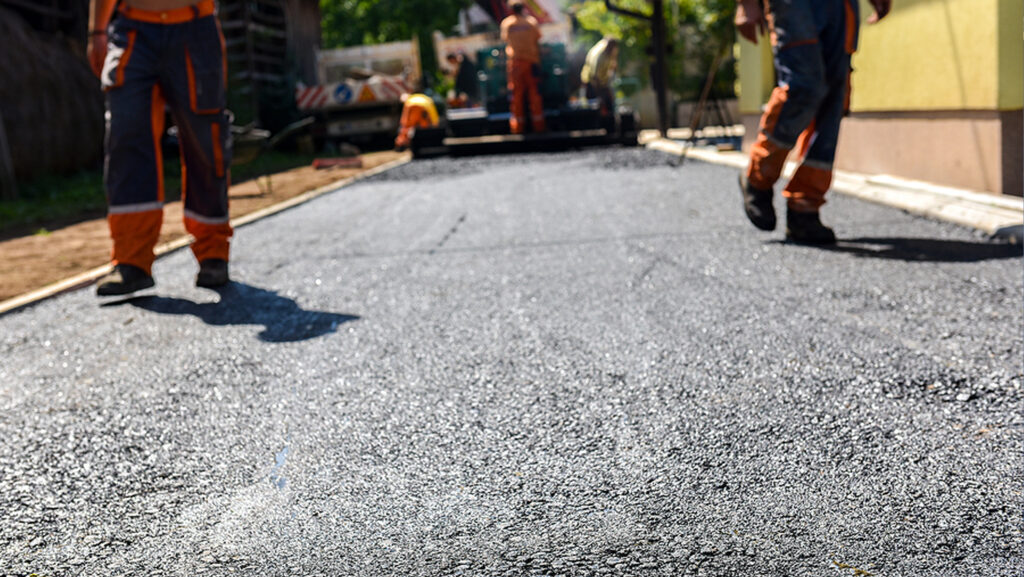When it comes to enhancing the curb appeal of your home, selecting the right driveway material is a crucial decision. Two popular options that homeowners often consider are oil and stone and asphalt driveways.
Both have their unique advantages and disadvantages, and the choice ultimately depends on your specific needs, budget, and aesthetic preferences.
In this article, we'll delve into the differences between oil and stone vs asphalt driveways to help you make an informed decision.
Understanding Oil and Stone Driveways
What is an Oil and Stone Driveway?
An oil and stone driveway, also known as a tar and chip driveway, is created by applying a layer of hot oil or tar onto the driveway base, followed by spreading a layer of loose stones on top. Once the stones are compacted into the oil, they create a textured, rustic appearance that many homeowners find appealing.
Pros of Oil and Stone Driveways
- Aesthetic Appeal: The natural look of the stones can enhance the rustic charm of your property.
- Traction: The textured surface provides better grip, making it safer during snowy or icy conditions.
- Cost-Effective: Generally, oil and stone driveways are cheaper to install than asphalt, making them an attractive option for those on a tight budget.
Cons of Oil and Stone Driveways
- Maintenance: These driveways require more frequent touch-ups to maintain their appearance and integrity.
- Durability: They are less durable than asphalt and prone to erosion, especially in areas with heavy rainfall or snow.
- Limited Color Options: The color choices are mostly limited to the natural hues of the stones used.
Understanding Asphalt Driveways
What is an Asphalt Driveway?
Asphalt driveways are made by mixing hot asphalt with aggregate and then compacting the mixture to create a smooth, uniform surface. They are known for their durability and low maintenance requirements.
Pros of Asphalt Driveways
- Durability: Asphalt is more resilient and can withstand heavier traffic and harsher weather conditions.
- Low Maintenance: It is easier to repair and resurface asphalt driveways, and they generally require less upkeep than oil and stone driveways.
- Aesthetic Options: Asphalt can be stamped or colored to create a unique look that complements your home's exterior.
Cons of Asphalt Driveways
- Heat Absorption: Asphalt can become very hot in the summer, which can be uncomfortable for walking barefoot.
- Regular Sealing: To maintain its appearance and longevity, asphalt driveways need to be sealed every 2-3 years.
- Oil Spills: Stains from oil spills are more visible and harder to clean on asphalt than on oil and stone driveways.
Comparing Oil and Stone vs Asphalt Driveways
Cost Comparison
When comparing oil and stone vs asphalt driveways, it's important to consider both the initial installation costs and long-term maintenance expenses.
While oil and stone driveways may be cheaper to install, they typically require more frequent maintenance, which can add up over time. On the other hand, asphalt driveways have a higher upfront cost but generally have lower long-term maintenance costs.
Aesthetic and Design Considerations
The choice between oil and stone vs asphalt driveways also depends on your aesthetic preferences and the design of your home.
Oil and stone driveways offer a more natural and rustic look, while asphalt driveways provide a sleek and uniform appearance. Consider how each option will complement your home's exterior and landscape design.
Environmental Impact
Both types of driveways have different environmental impacts. Oil and stone driveways are more permeable, allowing water to drain through and reducing runoff. However, asphalt driveways absorb more heat, which can contribute to the urban heat island effect.
Consider the environmental implications of each option and how they align with your sustainability goals.
Safety and Accessibility
Safety and accessibility are important factors to consider when choosing between oil and stone vs asphalt driveways. The textured surface of oil and stone driveways provides better traction in adverse weather conditions, reducing the risk of slips and falls.
Asphalt driveways, on the other hand, offer a smoother surface that is easier to walk and drive on, making them more accessible for people with mobility issues.
Maintenance and Longevity
Oil and Stone Driveway Maintenance
Maintaining an oil and stone driveway involves regular sweeping/raking of stones as they move, reapplication of oil and stone (when needed) to keep the surface intact and looking fresh. It's also important to address any weed growth and erosion promptly to prevent damage to the driveway.
Asphalt Driveway Maintenance
Asphalt driveways require sealing every 2-3 years to protect against weathering and cracking. Filling cracks and resurfacing the driveway when necessary can extend its lifespan and keep it looking attractive.
Making the Right Choice for Your Home
Choosing between oil and stone vs asphalt driveways comes down to assessing your budget, aesthetic preferences, and willingness to maintain the driveway.
Additionally, consider the climate in your area and how the driveway will be used to ensure that you select a material that will perform well under those conditions.
Why Choose PALERMO PAVING for Your Driveway Needs
Here at PALERMO PAVING (located in Bellport, Long Island), we understand that your driveway is more than just a functional space—it's an integral part of your home's curb appeal. Our expertise extends beyond just oil and stone and asphalt driveways; we can handle any type of hardscape improvement you need.
Whether you're looking for a rustic charm or a sleek, modern look, we have the skills and experience to bring your vision to life. Our commitment to quality and customer satisfaction ensures that your driveway project will be completed to the highest standards.
For expert advice and personalized solutions for your driveway project, contact PALERMO PAVING.

